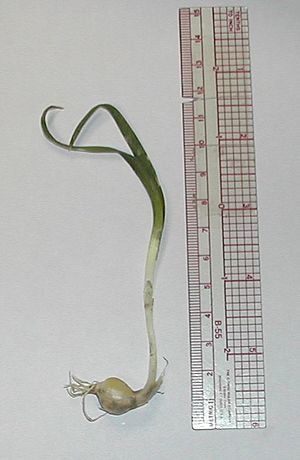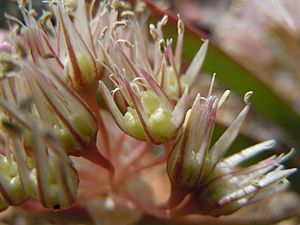Twinleaf onion facts for kids
Quick facts for kids Twinleaf onion |
|
|---|---|
 |
|
| Conservation status | |
| Scientific classification |
|
| Kingdom: | Plantae |
| Clade: | Tracheophytes |
| Clade: | Angiosperms |
| Clade: | Monocots |
| Order: | Asparagales |
| Family: | Amaryllidaceae |
| Subfamily: | Allioideae |
| Genus: | Allium |
| Species: |
A. anceps
|
| Binomial name | |
| Allium anceps Kellogg
|
|
| Script error: The function "autoWithCaption" does not exist. | |
Script error: No such module "Check for conflicting parameters".
The Twinleaf onion (scientific name: Allium anceps), also known as Kellogg's onion, is a type of wild onion plant. It grows naturally in the western parts of the United States. You can find it widely in Nevada, and it also grows in nearby areas of California, Idaho, and Oregon. This plant likes to grow in dry, rocky, or clay soils.
Contents
About the Twinleaf Onion
The Twinleaf onion is a perennial herb, which means it lives for more than two years. It grows from a bulb that can be up to 2 centimeters (about 0.8 inches) long and wide. Sometimes, you might find up to five bulbs growing together, wrapped in a brown or yellowish outer skin.
What the Twinleaf Onion Looks Like
This plant usually has two flat, smooth leaves that are shaped like a sickle. These leaves can grow up to 26 centimeters (about 10 inches) long.
A tall, straight stem, called a scape, grows up from the bulb. This scape can be up to 15 centimeters (about 6 inches) tall and is flattened with winged edges. At the top of the scape, there's a cluster of 15 to 35 flowers, shaped like an umbel (which looks like an umbrella). There are two leaf-like parts called spathes at the base of this flower cluster.
The flowers are shaped like stars and are about 1 centimeter (about 0.4 inches) wide. They have six pink petals, called tepals, with greenish lines. Inside the flower, there are six stamens, which are tipped with yellow parts called anthers. These anthers hold yellow pollen.
After the seeds grow and become ready, the scape and leaves usually dry up and break off.
How People Used Twinleaf Onion
The bulbs of the Twinleaf onion are safe to eat. The Northern Paiute people, a Native American tribe, used these bulbs as a food source. They would roast the bulbs and then press them into cakes to eat.
See also
 In Spanish: Allium anceps para niños
In Spanish: Allium anceps para niños
 | Madam C. J. Walker |
 | Janet Emerson Bashen |
 | Annie Turnbo Malone |
 | Maggie L. Walker |



